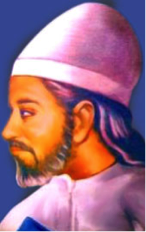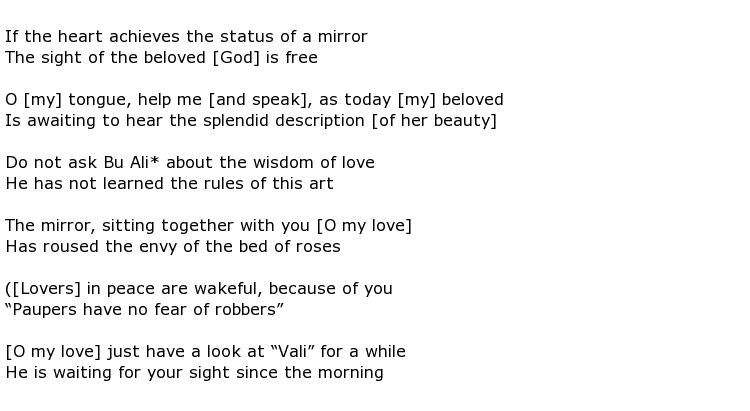 Wali Muhammad Wali was a South Asian classical Urdu poet who is known by a number of names including Wali Deccani, Wali Gujarati and Wali Aurangabadi, the latter name relating to his place of birth. He is considered to be the father of Urdu poetry, specifically because he was the first to compose the poetic form known as Ghazals using the Urdu language. This ancient poetic form can be traced back to Arabic poetry written long before the birth of Islam. Previously, ghazals were mostly written in the Persian language and Wali revolutionised this type of poetry, ensuring that he used Indian imagery, themes and idioms while also ensuring that some of the original Persian survived in his work.
Wali Muhammad Wali was a South Asian classical Urdu poet who is known by a number of names including Wali Deccani, Wali Gujarati and Wali Aurangabadi, the latter name relating to his place of birth. He is considered to be the father of Urdu poetry, specifically because he was the first to compose the poetic form known as Ghazals using the Urdu language. This ancient poetic form can be traced back to Arabic poetry written long before the birth of Islam. Previously, ghazals were mostly written in the Persian language and Wali revolutionised this type of poetry, ensuring that he used Indian imagery, themes and idioms while also ensuring that some of the original Persian survived in his work.
He was born sometime during the year 1667 in the city of Aurangabad, a place that is now part of the Maharashtra State. Details of his early life have not been recorded but it is believed that he loved travelling, seeing this as the kind of education that he could not gain from sitting in a school room with a book. Naturally, he went on pilgrimages to Mecca and Medina but he also visited such places as Surat, Delhi and Burhanpur. On his visit to Delhi, around the year 1700, his ghazals were heard and appreciated by so many people that other poets, such as Mir, Zauq and Sauda adopted this style and, in turn, became successful in their field.
He wrote in a sensuous, melodic style and the people of Delhi certainly warmed to this new form of ghazal. His poems reminded them of the beauty to be heard in a poem written in Rekhta, this being the old name once used for the Urdu language. Although he specialised in the ghazal style, he did experiment with other forms such as mukhammas and masnavi qasida. His ghazals numbered some 473 different pieces with 3,225 rhyming couplets.
His overriding subject seems to be mystical and earthly love, told from the male point of view. This was a departure from the old way, which tended to tell the story from the female perspective. He could skilfully weave his native Urdu with traces of the old Persian diction and imagery, thus incorporating both beauty and vigour into his poetry. For this skill he really should be considered the architect of modern poetry in his region, creating something quite unique.
The impact of Wali’s original poetry is lost to some degree when translated into English but here is a good example of one of his poems, written in the form of couplets. It is called If the Heart Achieves the Status of a Mirror:

Wali Mohammed Wali died during the year 1707 in Ahmedabad, the capital of the state of Gujarat. He was 40 years old. He was buried in that city but, unfortunately, his memorial tomb was razed to the ground during an attack by a Hindu mob who were rioting during the year 2002. Lovers of Urdu literature and the general public protested strongly about this desecration.

